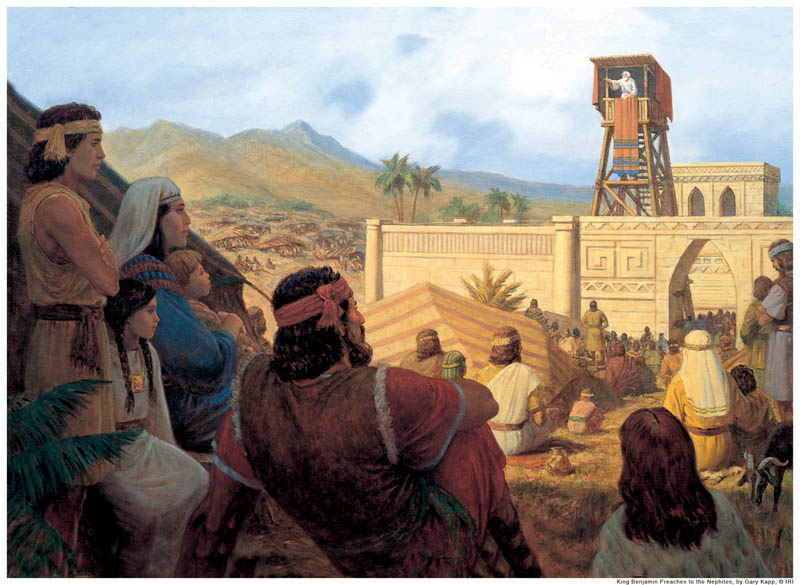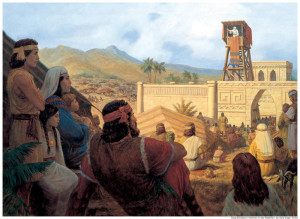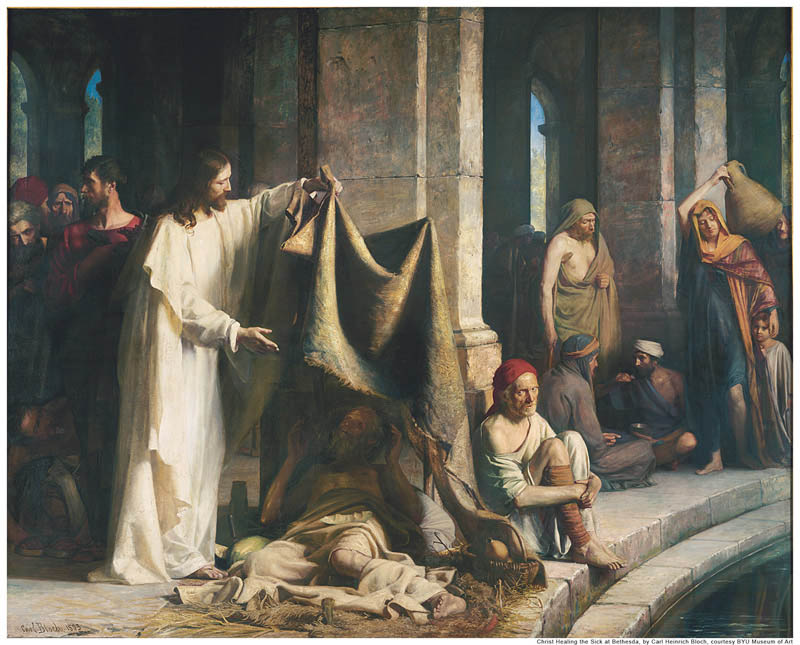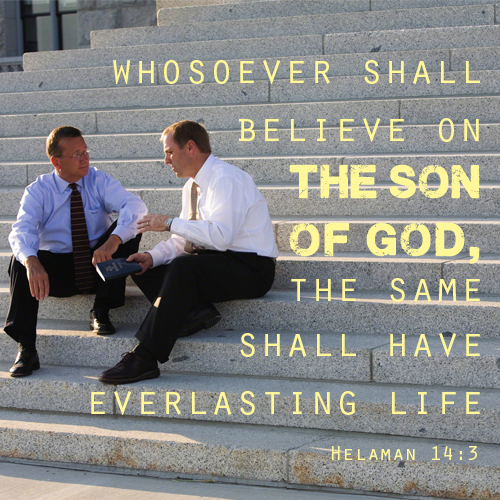In the previous article on commandments, we learned that a young man asked Jesus how to achieve eternal life. Jesus told him to keep the commandments and the man asked which ones he had to keep. Jesus’ answer disappointed him and he decided he preferred a fake form of conversion to the sacrifices required by true conversion.
Mormons—a nickname for members of The Church of Jesus Christ of Latter-day Saints, use both the Bible and the Book of Mormon as scriptures. The above story is found in the Bible, in Matthew 19.
 In the previous article I suggested that true conversion requires sacrifice. True conversion has the power to change our lives because it does require sacrifice. The Book of Mormon contains a sermon which illustrates the spiritual power of true conversion and how it impacts how the converted lead their lives. It explains why studies show religious people are more likely to perform service, give to charity, and to be involved in their communities. Of course, the sermon was given in ancient times, long before people did studies to prove obvious things.
In the previous article I suggested that true conversion requires sacrifice. True conversion has the power to change our lives because it does require sacrifice. The Book of Mormon contains a sermon which illustrates the spiritual power of true conversion and how it impacts how the converted lead their lives. It explains why studies show religious people are more likely to perform service, give to charity, and to be involved in their communities. Of course, the sermon was given in ancient times, long before people did studies to prove obvious things.
You can read the complete sermon yourself free online without any registration or requests for information. You don’t have to register to read the Book of Mormon free online. We will be focusing on the portion of the sermon recorded in Mosiah 4.
The setting for the sermon was the retirement of the king of a group of people in the Americas called Nephites. King Benjamin was much loved. Despite being the king, he held a secular job that appears to have involved manual labor and took no salary for his work as the king. He also devoted long hours to serving others. When he decided to turn his kingdom over to his son, he called all the people together to announce the change and to give his final sermon. They came with their tents and scribes copied the speech he planned to give. They spread out among the people to read it at the appointed time. King Benjamin had a tower built and spoke from it in order to reach as many people himself as possible.
Prior to this chapter the king had called on his people to repent and to obey God. He advised them to always remember Jesus, whom the prophets had testified to them would be born someday. The Holy Spirit was strong and the people were moved to repent. He then explained to them how their true conversion would impact them. Although Jesus had not yet been born and the term Christianity had not yet been invented, they were in essence Christians, or as the followers of Jesus called themselves in the Bible, Saints.
King Benjamin reminded his listeners that salvation comes only through the atonement of Jesus Christ. People could not, no matter how obedient, save themselves.
8 And this is the means whereby salvation cometh. And there is none other salvation save this which hath been spoken of; neither are there any conditions whereby man can be saved except the conditions which I have told you.
9 Believe in God; believe that he is, and that he created all things, both in heaven and in earth; believe that he has all wisdom, and all power, both in heaven and in earth; believe that man doth not comprehend all the things which the Lord can comprehend.
10 And again, believe that ye must repent of your sins and forsake them, and humble yourselves before God; and ask in sincerity of heart that he would forgive you; and now, if you believe all these things see that ye do them.
Then King Benjamin outlines the blessings that will come from a true conversion. It is interesting, though, that what he lists as blessings are probably things the young man who walked away from Jesus would consider negatives. It takes a true conversion, for many, to see what is about to be described as a blessing and not a trial.
He begins with something most people would be comfortable with. They will grow in understanding of the glory of God and of what is just and true. He assures them they will never be willing to let their own children go hungry, to quarrel, or to sin.
Just before that, though, is a message he will build on during the sermon. He says:
13 And ye will not have a mind to injure one another, but to live peaceably, and to render to every man according to that which is his due.
The young man who turned his back on Jesus might not have thought of that as a blessing, but if he had chosen to do as Jesus asked and had developed the deep testimony such an action might have required, he would soon have learned that turning outward and focusing on others instead of himself would bring him a happiness his great possessions never could. It would have changed how he lived out the rest of his mortal life:
16 And also, ye yourselves will succor those that stand in need of your succor; ye will administer of your substance unto him that standeth in need; and ye will not suffer that the beggar putteth up his petition to you in vain, and turn him out to perish.
17 Perhaps thou shalt say: The man has brought upon himself his misery; therefore I will stay my hand, and will not give unto him of my food, nor impart unto him of my substance that he may not suffer, for his punishments are just—
18 But I say unto you, O man, whosoever doeth this the same hath great cause to repent; and except he repenteth of that which he hath done he perisheth forever, and hath no interest in the kingdom of God.
19 For behold, are we not all beggars? Do we not all depend upon the same Being, even God, for all the substance which we have, for both food and raiment, and for gold, and for silver, and for all the riches which we have of every kind?
Here, Benjamin helps us understand that true conversion comes from a real understanding of what the atonement is. It is a gift God has given us that we don’t deserve. We, like some (but not all) beggars, may have brought on our sins through our own choices, but Jesus stepped in to help anyway. He didn’t say, “If they wanted eternal life, they should have made better choices.” Instead, He said, “They made mistakes, but they’re truly sorry for them now. Let’s make repentance possible.”
And if we really believe that the atonement was a free undeserved gift, we will be willing and even eager to “pay it forward” by finding others whose physical needs are as great as our spiritual needs and serving them—without first finding out if they deserve it.
After all. Benjamin reminds his listeners, those great possessions and the money we have are not really ours. They belong to God, who made it possible for us to have them. All He is asking us to do is to share the gift with others. He comforts those who are themselves in need or who really do have nothing to spare that they won’t face judgment from God for not giving as long as their heart is pure and they wish they could give. We aren’t asked to do more than we are able to do:
26 And now, for the sake of these things which I have spoken unto you—that is, for the sake of retaining a remission of your sins from day to day, that ye may walk guiltless before God—I would that ye should impart of your substance to the poor, every man according to that which he hath, such as feeding the hungry, clothing the naked, visiting the sick and administering to their relief, both spiritually and temporally, according to their wants.
27 And see that all these things are done in wisdom and order; for it is not requisite that a man should run faster than he has strength. And again, it is expedient that he should be diligent, that thereby he might win the prize; therefore, all things must be done in order.
King Benjamin’s sermon stands as one of the truly great sermons in Mormon scripture. It makes clear our responsibility to our fellow man and puts it in terms of the atonement. When we see the atonement as an undeserved gift, we feel more comfortable about giving. When we are truly converted and really understand the atonement, we give joyfully and obedience ceases, as the current Mormon prophet Thomas S. Monson says, to be an irritant.
Thomas S. Monson teaches us to serve others:
About Terrie Lynn Bittner
The late Terrie Lynn Bittner—beloved wife, mother, grandmother, and friend—was the author of two homeschooling books and numerous articles, including several that appeared in Latter-day Saint magazines. She became a member of the Church at the age of 17 and began sharing her faith online in 1992.






